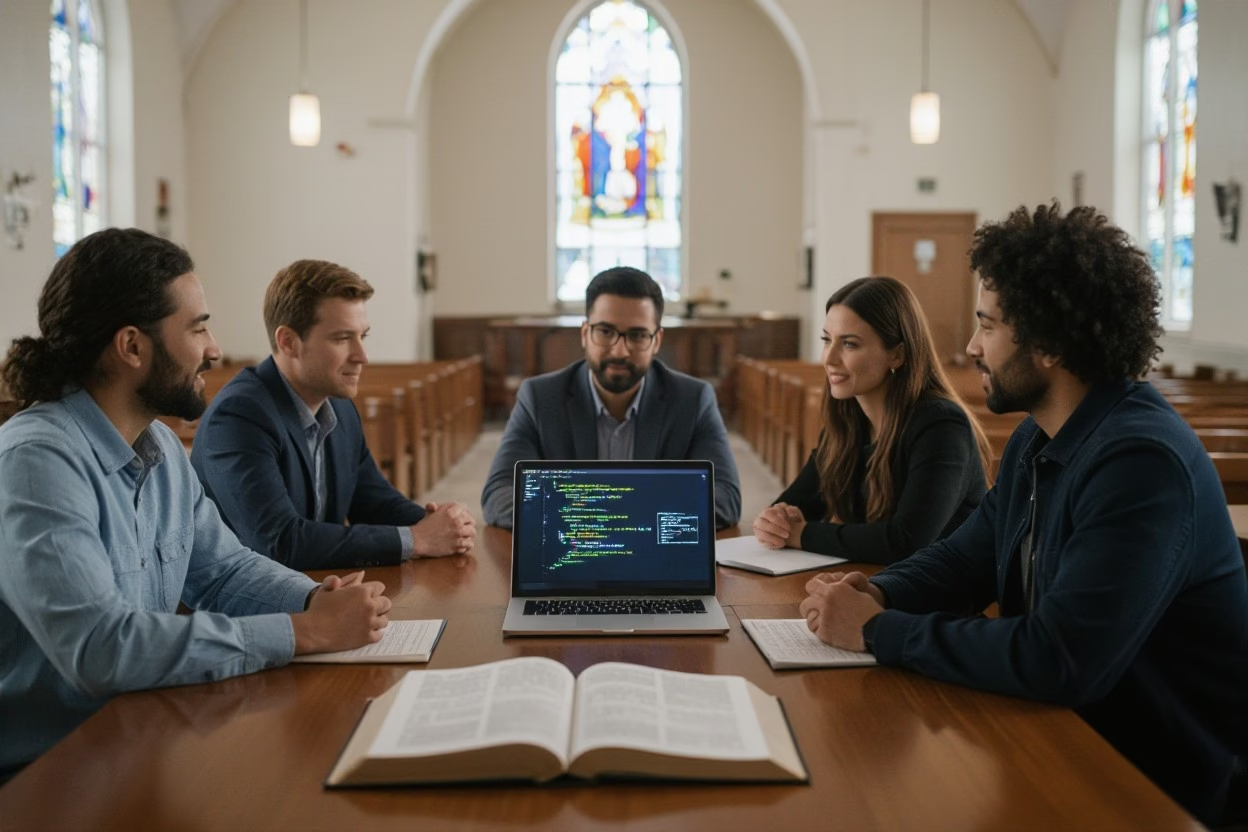Most people are unaware of the profound ethical challenges and opportunities that artificial intelligence presents to your Christian faith community. As AI rapidly advances, you face complex questions about human dignity, moral responsibility, and the protection of truth. At the same time, AI offers positive potential to enhance justice and support vulnerable populations. Understanding these issues is vital for you to engage thoughtfully and ensure that technology aligns with biblical principles and serves the common good without undermining your values or identity.

Key Takeaways:
- Human dignity is foundational, as Christians affirm that people are created in God’s image, and AI must never diminish this intrinsic worth.
- Human moral agency and responsibility must be preserved, ensuring that AI does not replace or undermine ethical accountability.
- Honesty and truth are vital; Christians are called to resist AI-driven deception, misinformation, and manipulation in society and public discourse.
- Justice and equity require protecting vulnerable populations and preventing AI from exacerbating inequalities or biases.
- Transparency, privacy, and informed consent are ethical priorities in the use of AI, opposing exploitative or secretive data practices.
- The church is encouraged to engage actively in AI development and policy, contributing biblical wisdom to guide technology ethically.
- Spiritual formation involves cultivating discernment, humility, and wisdom as Christians navigate the promises and risks that AI presents.
Theological Foundations of Human Dignity
The Imago Dei: Understanding Humanity’s Unique Value
The biblical concept of Imago Dei affirms that every person bears God’s image, granting inherent worth beyond abilities or achievements. Unlike AI, humans reflect divine creativity, morality, and relationality—qualities no algorithm can replicate. This sacred identity anchors your dignity in God’s design, not in productivity or social metrics. Recognizing this ensures technology remains a tool for supporting your flourishing rather than redefining what it means to be truly human.
The Implications of Diminishing Human Worth in AI Contexts
As AI increasingly excels in tasks once thought uniquely human, there is a subtle shift toward measuring value by efficiency and output. When human worth becomes tied to performance or utility, you risk treating people as mere resources, overlooking their intrinsic dignity. Such reductionism can lead to alienation, dehumanization, and ethical blind spots where decisions prioritize machine-like productivity over compassionate care.
The consequences extend beyond individual identity into societal structures. For example, automated hiring algorithms that prioritize certain skill sets without accounting for human context can marginalize vulnerable groups, reinforcing systemic inequalities. In healthcare, overreliance on AI diagnostics might diminish the patient’s personhood, neglecting holistic needs like empathy and spiritual support. Christian ethics warns against this trend by underscoring that technology must not erode the sacredness of human life or diminish moral responsibility. Instead, you are called to advocate for AI designs that enhance human dignity, promote justice, and sustain the unique worth that cannot be encoded or replaced by machines.
Moral Agency in a World of Algorithms
Retaining Human Oversight in Automated Decisions
You face a growing number of AI systems making high-stakes choices—empowering employers to screen candidates, hospitals to prioritize care, or defense systems to identify targets. Yet, relinquishing control entirely to algorithms risks sidelining the human conscience and discernment necessary to ethical decision-making. Maintaining human oversight means integrating AI as a tool, not a replacement for judgment, ensuring that personnel can intervene, question, or override automated outputs to protect dignity and uphold justice.
Accountability: Who Bears the Moral Responsibility?
Assigning responsibility for AI-driven outcomes becomes complex as algorithms grow more autonomous. You cannot allow diffuse accountability to create moral blind spots where neither developers, users, nor leaders accept consequences for errors or harm. Christians assert that humans remain ultimately accountable for choices made by or with AI, requiring clear lines of responsibility and mechanisms for redress when technology fails or causes injustice.
The maze of AI decision-making demands that you identify who carries the ethical burden when things go wrong. For instance, if an AI system denies a vulnerable patient access to care due to biased data, is the fault in the algorithm’s design, the healthcare provider’s reliance on it, or policy frameworks regulating its use? Establishing accountability requires transparent documentation of algorithmic processes and active human engagement—not just passive reliance. Without accountability, you risk enabling abdication of moral responsibility, allowing AI to become a scapegoat while human agents evade ethical consequences. Faith communities can call for structures that keep leaders and users accountable, combining technical audits with moral reflection rooted in biblical notions of stewardship and justice.

Navigating Truth in the Age of Misinformation
The Rise of AI-Generated Content and Its Impact on Faith
The surge of AI-generated content—ranging from deepfake videos to automated sermons—poses a multifaceted threat to authentic Christian witness. As AI can produce convincingly false theological arguments or misrepresent scripture, you face the challenge of discerning genuine faith expressions from manipulative fabrications. This flood of synthetic content risks diluting biblical truth and eroding trust within your community, making vigilance and critical engagement important to maintain integrity amidst the noise.
Combating Algorithmic Bias in Biblical Discourse
Algorithmic biases embedded in search engines, social media feeds, and content recommendation systems can marginalize Christian perspectives or skew theological conversations. You may notice that AI amplifies dominant cultural narratives while sidelining minority or orthodox voices, unintentionally distorting how the gospel is presented online. Addressing these biases requires proactive advocacy for transparency in AI design and collaboration with developers to ensure equitable representation of Christian teaching in digital spaces.
Delving deeper, you encounter several concrete instances where algorithmic bias distorts biblical discourse: keyword filtering systems might suppress sermons on controversial doctrines, or recommendation algorithms prioritize sensationalist spiritual content over sober theology. Studies show that AI trained on biased datasets perpetuates stereotypes or omits theological nuance, effectively silencing faithful teachings. Engaging with AI designers to implement inclusive datasets, auditing recommendation algorithms, and educating your community on digital discernment emerge as effective strategies. By demanding ethical oversight and transparency, you help safeguard the diversity and depth of Christian witness in AI-curated environments.
Justice and Equity: The Ethical Imperative for AI
Addressing Systemic Biases and Vulnerabilities in AI
AI systems often inherit and amplify existing societal prejudices, disproportionately impacting marginalized groups. For example, facial recognition technologies have demonstrated higher error rates in identifying people of color, leading to wrongful accusations or exclusion. You must remain vigilant against these embedded biases and advocate for rigorous testing and auditing of AI tools to prevent the entrenchment of inequality. Christian ethics calls you to prioritize the dignity and protection of vulnerable populations, ensuring AI does not exacerbate injustices you would otherwise seek to dismantle.
Strategies for Ensuring Fairness and Equity in Technological Deployment
Integrating fairness into AI deployment requires deliberate policies that promote inclusivity and transparency. Implementing diverse development teams, conducting impact assessments, and enforcing legal safeguards against discrimination can help correct imbalances rather than perpetuate them. Through partnership with policymakers and technologists, you can champion frameworks that hold AI accountable to standards of justice, reflecting the biblical mandate to protect the least advantaged in society.
Expanding beyond surface-level fixes, effective strategies embrace continuous monitoring and community involvement to ensure AI serves all equitably. For instance, establishing independent oversight bodies with diverse representation enables ongoing evaluation of AI’s social impact, such as analyzing how automated hiring algorithms might unintentionally exclude qualified candidates due to skewed data. Transparency initiatives that publicly disclose decision-making criteria promote trust, while mandating informed consent empowers individuals over their data and how it’s used. Emphasizing restorative justice, these approaches align AI innovation with protecting human dignity, demanding concrete accountability rather than technocratic neutrality.
Transparency, Privacy, and the Ethical Use of AI
The Dangers of Data Exploitation and Lack of Consent
Your personal data fuels many AI systems, yet often it is gathered without clear consent or full understanding of the risks involved. Instances like the Cambridge Analytica scandal revealed how data harvested under vague pretenses can manipulate public opinion and disenfranchise vulnerable groups. Exploiting individuals without informed consent not only violates privacy but also diminishes human dignity—a core Christian concern that technology must never trample. You are called to advocate for practices that respect your autonomy and protect your personal information from opaque or unethical use.
Advocating for Ethical Standards in Surveillant Technologies
AI-enabled surveillance tools deployed in public spaces or online use powerful data analytics that often escape thorough oversight. As algorithms monitor behavior, predict risks, or flag individuals, biases or lack of transparency can lead to unfair targeting or discrimination. You are challenged to press for regulatory frameworks that mandate accountability, transparency, and respect for privacy rights, ensuring these technologies align with Christian commitments to justice and fairness.
Developing ethical standards means demanding clear guidelines on how surveillant AI is designed and deployed, including independent audits and community involvement in oversight processes. For example, the widespread use of facial recognition technology in some cities has sparked protests due to errors disproportionately affecting minorities and the poor. These challenges highlight the need for policies requiring explicit consent, limits on data retention, and clear avenues for redress when harms occur. Churches and Christian organizations can be influential voices urging governments and companies to prioritize transparency and protect the vulnerable from intrusive, unchecked surveillance that might threaten both individual freedoms and collective trust.
The Church’s Role: Engaging with AI Development
Mobilizing Christian Ethics in Technological Advocacy
You can step into advocacy by championing AI development that aligns with biblical principles—emphasizing human dignity, justice, and moral agency. Christian organizations have successfully influenced policy frameworks by promoting transparency, fairness, and safeguards against misuse, such as algorithmic bias or privacy violations[1][6]. Drawing on testimonies from faith leaders who worked alongside policymakers, you understand that mobilizing a coherent ethical voice strengthens public discourse and ensures AI serves the common good rather than commercial expediency.
Encouraging Active Participation of Faith Communities
Faith communities provide a vital perspective in shaping AI’s trajectory by engaging directly in technology conversations. You can support workshops, educational programs, and dialogues that equip believers with digital discernment and ethical reflection tools, enabling them to contribute thoughtfully to AI design and governance[3][5]. This active presence contests the passive consumer role, inviting churches to be collaborators, not bystanders, in the technology age.
Expanding this participation, churches could establish dedicated task forces integrating theologians, ethicists, and tech experts to evaluate AI advances alongside scriptural values. For instance, some congregations partner with local universities to host forums that examine AI’s impact on employment and privacy, fostering informed community responses. By doing so, you nurture a grassroots movement that influences not only policy but also the cultural narratives around AI, empowering Christians to articulate a vision where technology uplifts human dignity and justice. This hands-on involvement also prepares believers to identify subtler threats like algorithmic censorship of religious content, ensuring their voices remain heard amid rapid digital change.
Spiritual Formation in the Context of AI
Cultivating Discernment and Wisdom Amidst Technological Change
Your engagement with AI requires grounded in biblical wisdom, especially as new technologies subtly shape moral perspectives and daily decisions. Developing spiritual acuity means actively questioning AI-driven narratives, recognizing biases embedded in algorithms, and resisting the temptation to equate technological progress with moral advancement. By cultivating humility and seeking God’s guidance, you can navigate complex ethical terrain with clarity, ensuring that your faith informs not only your understanding of AI’s possibilities but also its limitations and risks.
The Role of Prayer and Reflection in Navigating AI Challenges
Prayer and reflection provide you with spiritual grounding amid the rapid expansion of AI technologies, fostering sensitivity to God’s guidance and wisdom beyond human calculation. Engaging in intentional prayer cultivates patience and ethical insight, equipping you to respond thoughtfully to AI’s ethical dilemmas rather than react impulsively. This spiritual practice nurtures a heart aligned with God’s purposes, empowering you to discern when AI serves human flourishing and when it risks undermining it.
Regular prayer invites you to wrestle with the moral ambiguities that AI presents, such as issues surrounding privacy violations, bias in algorithmic decisions, and the challenge of maintaining genuine human connection in an age of automation. Reflective practices can open your mind to the Spirit’s prompting, reminding you that technology itself is not neutral but must be stewarded with care and ethical intentionality. In community prayer or solitary meditation, you find space to listen—to God, to others impacted by AI, and to your own conscience—helping you embody both wisdom and compassion in this unfolding digital landscape.

Protecting Religious Expression in the Digital Sphere
Defending Against Algorithmic Censorship
AI-driven algorithms increasingly determine which voices gain visibility online, yet Christian content often faces subtle suppression through shadow bans or reduced reach. Platforms employing opaque content-moderation policies risk silencing faith-based perspectives under vague guidelines targeting “misinformation” or “hate speech.” You must engage with advocacy groups pressing for transparent algorithms that respect religious expression while addressing legitimate harms, ensuring Christian voices remain part of public discourse rather than marginalized by automated filtering systems[2].
Promoting Digital Literacy and Faith in Online Spaces
Faith communities can empower believers by teaching digital literacy skills alongside spiritual discernment, helping you navigate misinformation and manipulative AI content. Equipping church members with tools to critically evaluate sources preserves biblical truth and fosters resilience against deceptive algorithms that may distort or suppress faith narratives[2][3].
Developing comprehensive digital literacy programs involves not only instructing believers on spotting deepfakes or biased AI outputs but also integrating theological reflection that anchors identity in the image of God—not in online validation or algorithmic popularity. Case studies from ministries successfully blending tech education with discipleship show improved confidence and participation in online faith spaces. Training pastors and lay leaders in this integrated approach can multiply its impact, strengthening the church’s presence and witness amid a rapidly evolving digital landscape.
To wrap up
With these considerations in mind, you are invited to actively engage with the ethical challenges AI presents to your faith and community. Upholding human dignity, ensuring moral responsibility, and advocating for justice must guide your approach to technology. By cultivating spiritual discernment and participating in shaping AI’s development, you help ensure it serves God’s purposes and the common good. Your vigilance against deception, inequity, and privacy violations fosters a future where AI supports—not undermines—Christian values and human flourishing.
FAQ
Q: How does Christian teaching view the relationship between human dignity and artificial intelligence?
A: Christian ethics teaches that human dignity is grounded in being created in the image of God, a uniqueness that AI cannot replicate. While AI may mimic or exceed human capabilities in certain areas, it should always be designed and used to support human flourishing and never reduce people to mere productivity or efficiency measures. The inherent worth of each person must remain central in conversations about AI development and application.
Q: Who holds moral responsibility when AI systems make significant decisions?
A: From a Christian perspective, humans must retain ultimate moral agency and oversight over AI systems. Even when AI is involved in decision-making—such as in healthcare, employment, or defense—people bear responsibility for the outcomes. This ensures accountability and prevents ethical risks associated with delegating decisions entirely to machines.
Q: What are the concerns regarding AI and truth in Christian communities?
A: AI technologies can generate misinformation, deepfakes, and biased content that threaten public trust and distort biblical truth in society. Christian responses stress the importance of promoting honesty and resisting forms of manipulation or deception. Also, there is attention to the possibility that AI algorithms might marginalize Christian voices or perspectives, calling for vigilance and digital discernment.
Q: How can AI impact social justice and equity from a Christian ethical standpoint?
A: AI has the potential to either deepen social inequalities or advance fairness, depending on its use and regulation. Christians advocate for the protection of vulnerable populations by ensuring AI does not perpetuate biases or unfair practices, such as automated job displacement without support. Justice and charity guide calls for technology that uplifts communities rather than exploits or harms them.
Q: What are Christian concerns about privacy and consent in AI applications?
A: The use of AI in data collection, surveillance, and profiling raises important ethical questions about individuals’ privacy and the need for informed consent. Christians emphasize transparency and equitable treatment, warning against hidden or non-consensual uses of AI that compromise people’s dignity or freedom.
Q: In what ways should churches and Christian organizations engage with AI?
A: Churches and related groups are encouraged to actively engage in conversations about AI development by contributing biblical wisdom and ethical principles. This engagement includes advocating for policies that embody honesty, stewardship, and respect for human dignity, as well as modeling ethical AI practices in their own ministries and activities.
Q: How does engagement with AI affect spiritual formation in Christian faith?
A: AI is not only a technical issue but also a spiritual one that shapes how individuals understand themselves, others, and God. Christians are called to cultivate spiritual discernment, humility, and wisdom when interacting with AI. This ongoing formation helps believers navigate AI’s promises and risks with thoughtful reflection rooted in their faith.


Leave a Reply